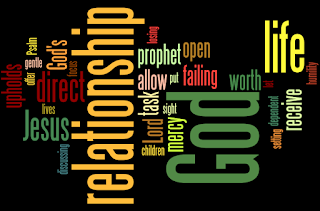In the half light of a gray San Francisco day
she walked in asking for Pietro, the shoemaker.
She wanted to thank him for cladding
her Missionaries of Charity all these years; remaking
their Dollar Store flip-flops into substantial footwear.
An entourage of young nuns wearing thin white saris trimmed
in blue
flitted about her like excited birds. She was a small woman
but not frail and when she entered the tiny shop,
time paused for a moment.
She took Pietro's worn hand
in hers, and I knew I was in the presence
of not one saint, but two.
A fragrance of compassion surrounded me and
when I looked into her eyes, I saw a little mystery
and a little mourning.
Pietro knelt,
not in supplication, but insistence on tracing her feet
to make a pattern for sandals.
They were not delicate feet, but sturdy
with the texture of well-worn leather; feet belonging to a
soul
who had walked barefoot under a waning Calcutta moon,
laying hands upon the dying and the destitute
until darkness faded.
She stepped onto the paper, her whole body
luminous, Pietro gently pressing her foot,
outlining the shape of it
with a pencil he took from behind his ear,
carefully tracing curve each toe like a scribe
recording an encounter with the divine.
--Morgan Ray, Shoes
for Mother Teresa
Image sourcePoem source











